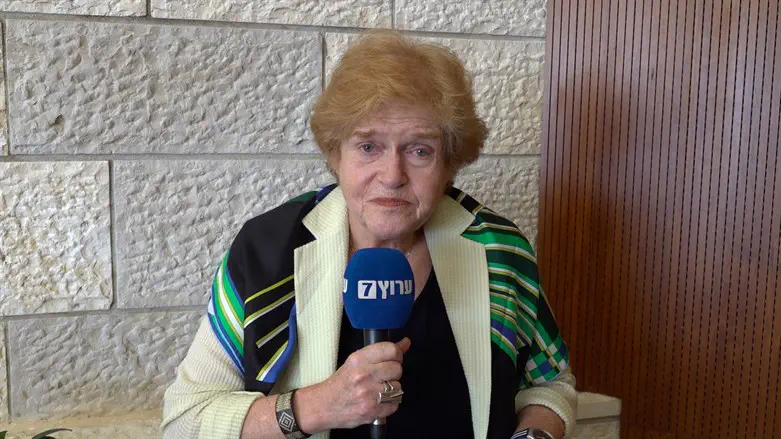
Ambassador Deborah Lipstadt, the United States Special Envoy to Monitor and Combat Antisemitism, was in Israel this week after visiting Saudi Arabia.
“It wasn't happenstance that I started in Saudi Arabia. This was my first tour as ambassador, as a special envoy to monitor and combat antisemitism, and when my team at the State Department was beginning to arrange my overseas travel… I said I want to start in the Middle East, I want to go to the Gulf and if possible i want to go to Saudi Arabia, and it worked out and it was a very fascinating experience,” says Lipstadt, speaking to Israel National News from Jerusalem.
“For decades in the past Saudi Arabia was a major exporter of antisemitism, and in the past few years it has begun to really reevaluate that position. It has people who monitor the Friday sermons for antisemitism, [which] has dropped precipitously, textbooks which were replete witha ntisemitic comments and innuendo have been rewritten, the head of the Muslim World League went to visit Auschwitz four years ago with 60 imams. I met people who really talked to me. One minister identified himself as coming from Medina. He said [that was] where your people were too.”
In Israel for a conference and meetings, Lipstadt explains that the growing antisemitism seen online, especially on social media, is the area that is the most urgent to deal with, as it involves the younger generation whose lives revolve around social media.
She also mentions the problematic rise of right wing nationalist antisemitism, which she calls “very disturbing with its overt antisemitism.”
“We see antisemitism coming not just from the right, we see it from all different directions. I’m not saying it's all the same, I’m not saying it's all equal,” she says. “We see it from the left, we see it from the right. It's different, it's more extreme sometimes, more people getting killed from one direction or other but you've got to address both of them, you can't ignore them.”
Responding to reports that Russia is starting to ban Jewish Agency work and activity in terms of immigration, Lipstadt says:
“I worry and wonder, ‘Is this the tip of the iceberg?’ I met recently with a rabbi from Russia who had to leave Russia because he was not an ardent supporter of Putin’s war against Ukraine, and he has been a rabbi in Moscow for years, and he expressed a deep-seated concern about the safety of Russian Jewry. I worry about this, it’s not a good sign at all.”
When asked how she defies the differences between antisemitism and criticism of Israel, she says that while legitimate criticism of Israeli policy is not antisemitism – as Israelis frequently criticize government policies themselves – criticism of Israel can often morph into antisemitism or can be a cover for antisemitism.
“I often say that when it comes to antisemitism, particularly in relation to the State of Israel, there’s a lot of people who in their criticisms of Israel use antisemitic imagery, use the antisemitic innuendo, and there’s some people who are antisemites who know that it’s not cool to be an antisemite so they say I’m not an antisemite, I’m just against Israel.”
Lipstadt shoots down concerns that there are antisemitic elements in the Democratic Party coming from radical left “Squad” members in Congress.
“The vast majority of the Democratic Party’s not antisemitic, some of the people, particularly those from the progressive left, have made statements that are highly critical of Israel, and some of those statements have crossed the line into antisemitism. Whether these people are antisemites or not, you know that's between them and their cardiologists. I don't care what they are but when they say something that's antisemitic, it has to be called out.”
Prime Minister Yair Lapid was recently criticized for comparing antisemitism to other prejudices. Lipstadt, who met with the prime minister this week, comments that he was partly correct, but that antisemitism also exists as a unique form of discrimination that is different from all other forms of hatred. And this was a topic of conversation between them at their meeting.
“In certain respects it's a prejudice like other prejudices,” she explains. “If a Jew does something bad that's how Jews are, if a Jew does something good, the the antisemite says, ‘That's one of the good ones.’ So in that respect antisemitism is a prejudice like other prejudices. But it also has unique characteristics. It not only looks down on Jews, but in addition to that the antisemite, unlike the people who have these other hatreds, punches up: The Jew is more powerful, the Jew is smarter, the Jew is richer, the Jew is a bigger threat. So not only do they loathe Jews down below, they fear Jews and if you loathe someone and fear them, you've gotta attack them, weaken them. So I think there are places to compare and there are places to contrast.”
The antisemitism envoy is also very much concerned about the rise of antisemitism in the US. She says that while her job as part of the State Department is to work overseas on antisemitism, the fact that antisemitism is increasing in the US, does not mean there is not a role for her to address it in other countries.
“You do both at the same time. You address problems within your midst and then you also say as a country, ‘We are concerned about this in other places,’” she says.
